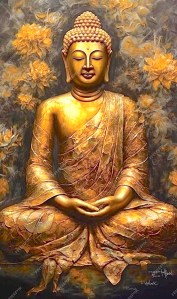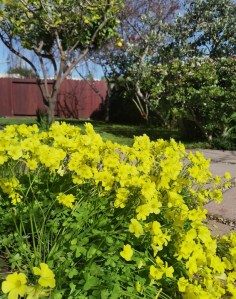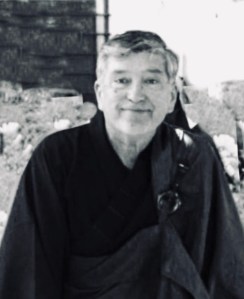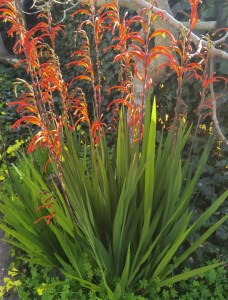
Buddha Bows to Buddha
by Rev. Kinrei Bassis
The basic teaching in Buddhism is very simple and straightforward. The essence of the Buddha’s Dharma is in the Buddha’s very first teaching after his great enlightenment — the Four Noble Truths. Yet, although I have been practicing Buddhism for most of my adult life, I still often find it very hard to apply the Four Noble Truths to all the various difficulties I face in my life.
The Four Noble Truths are not a complicated teaching. The First Noble Truth is that suffering exists and that we cannot avoid suffering due to the impermanence of every single condition in our life. The Second Noble Truth, that all our suffering is due to our desires, to our clinging to what we want and pushing away what we do not want. The Third Noble Truth is often translated as the cessation of suffering or attaining Nirvana. The Fourth Noble Truth, the Eightfold Path, is Buddhist training It shows how we can convert our deluded self into a liberated being, a Buddha, and free ourselves from all suffering.
Applying the Second Noble Truth lies at the core of all Buddhist training: to free ourselves from suffering, all we need to do is stop clinging. After living with many Buddhist monks, with Buddhist Masters and teaching Buddhism for forty years, it is actually unusual and a sign of deep Buddhist training when someone fully embraces the teaching that all their suffering is actually flowing out of their clinging. I encounter much Buddhist teaching that clearly states the Second Noble Truth but then does not take this teaching to heart and actually apply it to whatever they view as suffering. It is wonderful when I deal with someone who has encountered something going seriously wrong in their life and instead of blaming anything or anyone, they recognize that they are choosing to make what is happening into suffering. It is our clinging and desires that we all need to let go of. We live with a mistaken view that a good life is getting what we want rather than the enlightened view that a good life is found by wholeheartedly embracing and dealing with whatever life is giving us.
Buddhism would be an easy path if there was some magical way in which we could stop clinging and just let go of whatever is causing us to have difficulties. When we are suffering with significant pain, with strong fear, with powerful desires, with anger, with feeling deep depression, what do we do? How do we apply the Second Noble Truth when we seem to be incapable of not allowing ourselves to be filled and overwhelmed by our difficulties?
Yet all of Buddhist training can be seen as the process of converting these defiled emotions and thoughts into enlightened emotions and thoughts. However, this means we need to fundamentally change how we relate to almost everything in our life. That is why the Buddhist path is not a short and quick solution for our suffering.
The real underlying reason we meditate in Buddhism is that meditation is actually a practice of learning to let all things go. Whatever we are feeling, whatever we are thinking, the practice of our meditation is let go of all our thoughts and feelings and come back to being still and present. The pure act of meditation is the same as the full acceptance. It is the real meaning of sitting still. We do not need to react to whatever strong feelings and thoughts are moving through us. Our personal karma underlies the patterns of our compulsive thoughts and feelings which are propelling us through life. The normal human pattern is to try to avoid and push away all our feelings that are painful and difficult. Our normal unenlightened human karma is usually driving us to obsessively try to solve the problems we face in our life and figure out what we need to do, driving us to try to control what is happening in our life. Buddhism is not teaching us that it is wrong to try to get better feelings, try to get better conditions in our life, try to understand and control what is happening to us. But we need to face the reality that much of what we wish to control is often going to be completely outside our personal control. Much of what I face in life, all the thoughts and feelings that arise in me, the conditions of the people in my life and conditions in the world around me, are all part of an endless flow of karma. Whenever we start battling the conditions in our life, this lack of acceptance will only lead us to create more suffering. If we choose to be at peace with whatever we are facing and simply do our best to improve whatever we can, this attitude of acceptance will lead us to finding more peace and a deeper sense of happiness.
The real purpose of meditation and Buddhist training is the process of learning to trust that we can find our real unshakable happiness by opening our hearts to whatever is flowing into our lives. The ongoing effort we make of trying to be still in meditation is showing us how we do not need to be moved by our defiled emotions, to react and be moved by our anger, by our fear, by our self-centered desires. Meditation points us to a fundamental stillness that allows all our karmic tendencies, all the importance we give to what is happening in our life, to flow back into stillness. This helps our mind and heart to experience the real purity that is everywhere when we stop seeing ourselves and the world through self-centered eyes. “When you look with the eyes of a Buddha, you will see the heart of a Buddha.”
Most people feel that in being human, there is no way we can free ourselves from being deeply absorbed in our desires and fears. We can feel that something is actually being damaged when we are criticized or treated unfairly. The deluded mind thinks that illness and disability automatically makes us suffer. Having wealth, having success, being admired, is how we can find happiness. Someone is deeply hurt by another’s behavior and they will say it is only human to be upset and angry. Yet the enlightened response is trusting that nothing was really hurt and then having compassion for both the person who has hurt you and compassion for your own painful feelings. Buddhism is pointing us to work at having the right spiritual intention so we try to have the enlightened response rather than the very human but deluded response of filling ourselves with anger and harsh judgments.
Below is a teaching from the Dalai Lama on forgiveness which is wonderful example of the enlightened response towards mistreatment.
After he escaped from Tibet, Lopon-la put in prison by Chinese. He stayed there eighteen years. When he finally free, he came to India. For twenty years, I did not see him. But he seemed the same. Of course looked older. But physically OK. His mind still sharp after so many years in prison. He was still same gentle monk.
He told me the Chinese forced him to denounce his religion. They tortured him many times in prison. I asked him whether he was ever afraid. Lopon-la then told me: “Yes there was one thing I was afraid of. I was afraid I might lose compassion for the Chinese.”
I was very moved by this, and also very inspired. Forgiveness helped Lopon-la in prison. Because of forgiveness, his bad experience with Chinese did not got worse. Mentally and emotionally, he didn’t suffer too much. He knew he could not escape. So, better to accept reality than to be traumatized by it.
In life, we can have a very painful illness but after we recover, the pain recedes in our memory and usually we are not traumatized by what had happened. Yet when someone mistreats us, it is possible to remain upset and angry for the rest of our lives. Yet from a Buddhist point of view, a tree falling on us or someone injuring us is really the same. Both are just karma. We cannot blame the tree so that does not even occur to us. We often feel comfortable blaming the person who mistreats us. However, if you can see the full flow of karma, the personal history of the person who is making the mistake of hurting us, we could have understanding and compassion rather than having harsh judgements and anger. And we can learn to trust and experience the deeper truth that nothing can ever really be fundamentally hurt.
“Pain, if you seek serenity in Oneness, will vanish of its own accord. “ On Trust in the Heart-Kanchi Sosan
My Master, Jiyu-Kennett, trained as the only woman in an all male monastery in Japan during the 1960’s. She faced a considerable amount of mistreatment. In her published diaries of her years in Japan, The Wild, White Goose, Rev. Master Jiyu repeatable gives herself this teaching as she confronted the many difficulties she faced: ”I must take everything that happens as for my own good, whatever it may be.” This does not mean that all the Japanese male monks who mistreated her were not making a mistake and doing something wrong. The conversion of our hearts which lies at the center of Buddhist training is we must accept and make positive use out of whatever life gives us, whether it is illness or health; whether we are treated kindly or poorly; whether we are being treated fairly or unfairly. The very nature of karma is we are always being given both good and bad conditions in our life. The very core of the letting go of clinging to our desires is cultivating an open and embracing mind and heart that is all accepting. How we deal with all the unwanted conditions in our life is central in transforming our hearts and minds.
A very positive aspect of Buddhist training is many people will have a serious illness like cancer and after having undergone difficult treatments, they will tell me that actually having the cancer was a positive experience. The illness had really helped them in their spiritual life to view whatever is happening to them with more wisdom and acceptance. Yet none of them wish for the cancer to return or wish to have any more serious problems. I recently read this account in the New York Times, Brain Cancer Was Supposed to Kill Me. Instead, It Gave Me a Second Life. A devastating diagnosis prompted a reporter to revisit his past — and repair his mistakes. The author of the account, Rod Nordland, writes “I know it sounds a bit crazy, but as I’ve often told people, my brain tumor is the best thing that’s ever happened to me.” Rod Nordland’s illness allowed him to drop many of his usual concerns and look much deeper at his life. This is something that we all need to do whether we are facing some enormous difficulties or just dealing with our seemingly mundane and ordinary life. All our difficulties and problems can have a very positive use in that they can help us to have more compassion and wisdom which then helps us to open our hearts to our own difficult karma and to all the difficult karma that is filling others around us and the world.
“Taking everything that happens for my own good” includes how we view the world. People usually view the world with deluded eyes that are critical and upset with all the bad news. I am fairly certain we will never be in a world that is not filled with bad news since when something goes well, it is generally not a news story. It is important to view all the difficulties that fill the news and the world with wise and compassionate eyes. Just there are deep karmic reasons that people in your life will make mistakes and do wrong, all the people in the world are also frequently being driven by difficult karma and they are finding it very hard to do good. For instance, people behaving selfishly is actually very normal human karma. Buddhist training is the process of converting our selfishness but when we recognize how hard we are finding that conversion, we can open our hearts to a world filled with people who are sometimes having great difficulty in not being selfish. Feeling hurt and pain when we hear about some of the intense suffering in the world is normal and appropriate but we should not just fill our minds with these reports of suffering. We also need to always look with gratitude for all the good that is also around us and occurring in our life and in the world. And we also need to look deeper and see through the seemingly substantial nature of all the suffering and realize all the suffering in samsara is ephemeral. This does not mean we do not do all we can to relieve suffering. For instance, if I am bleeding or in pain, I will naturally try to heal the problem. Yet cultivating a peaceful and all-accepting mind does not mean I will not still deal with an open wound. Yet even if I am in severe pain or dying, I can also still realize that all of this life of mine has no more substance than a dream. Buddhism is teaching us to awaken from being just lost in this dream of birth and death.
The original Buddhist practice was monks only ate the food that was given to them when they went around the local area, begging for food. Although many Buddhist traditions have relaxed or dropped the actual begging for food, Buddhist monks still always receive a begging bowl when they receive ordination as Buddhist monks. The begging bowl became the symbol that monks should always bow and be grateful for whatever they are being given. Spiritually, the deeper teaching is that we need to bow and be grateful for whatever life offers us. Whatever good and bad karma we have, it all goes into our begging bowl. Health and sickness, praise and blame, success and failure, youth and old age, they all go into our begging bowl. The good and bad in the world, war and peace, saving or killing animals, people starving and people overeating, great generosity and great selfishness- it all goes into our begging bowl and we bow to it all.
Samsara, this world with so much suffering and nirvana, this place fully free of suffering, is actually the same place. When we look with deluded eyes it is samsara; when we look with enlightened eyes, it is not that we no longer see samsara but we can see through samsara and see the fundamental purity and light enveloping everything. It is why Buddhism teaches samsara and nirvana are one.
When I was at Shasta Abbey, I often had the job to go to the monastery gate and deal with whomever showed up. Rev. Master Jiyu used to like saying if someone who is drunk shows up at the gate, you do not let them into the monastery. However, you should still bow to them because they are still a Buddha, even though they are a drunk Buddha. And when they are sober, you can let them into the monastery. This teaching can be expanded to everything in our life. What- ever we encounter in our life is a Buddha. When we bow to whatever karma we are facing, we are pointing ourselves to enlightenment. Buddha bows to Buddha is the actual truth when we clear delusion from our eyes. Let us try to keep making the effort to bow to whatever we are being offered in life and this will help us to see the light of Buddha in others and this bowing will also help us to see the light of Buddha within ourselves.

Priory News
by Rev. Kinrei
I am sorry to offer this sad news but Michael Lara died Wednesday, March 27. He was in the hospital and had been having serious health problems particularly with his breathing but his death was not expected. He died one day before his 90th birthday. The Priory plans to hold a memorial for Mike on Sunday, April 7 at 12 pm. The memorial will also be available on the Priory Zoom.
Mike was in the Berkeley meditation group in 1973 that started the Berkeley Buddhist Priory. For most of the fifty year history of the Priory, Mike was a core member of the Priory lay Sangha, providing a great amount of help and guidance to everyone at- tending the temple. There was no one in our lay Sangha who did more to help the Priory to exist and to continue to offer the Dharma. Mike did various jobs for the temple and was a big help in the overall running of the Priory. For many years, his constant presence at morning meditation and most temple activities was a help to the whole Sangha. When Mike did not attend our ceremonies, it was noticeable that we missed Mike’s strong voice which helped everyone’s singing to follow the music.
I first met Mike as a layman in 1977 when the Priory was in Oakland. I still remember his kindness and thoughtfulness to me as he helped this raw beginner adjust to the practice. I remember losing my wagesa and, without telling me, Mike sewed me a new one. It was a typical case of Mike’s deep kindness and thoughtful- ness. I am deeply grateful for all the help Mike gave to me in my years as the Prior and his help to the temple and our Sangha. I know that I will deeply miss him and I know that will be true of many in the Priory Sangha.

With Gratitude
Charity is one of the four wisdoms and demonstrates the Bodhisattva’s aspiration. The generosity of the entire Priory Sangha is what makes it possible for the Priory to exist and for the Dharma to be freely offered to whomever is interested.
In recent months, we have been given many generous gifts, including an office chair, flowers, books, plants and paper towels.
Providing monks with food is the traditional offering given when coming to a Buddhist temple, and we appreciate all the generous food offerings we have been given. During the past few months we have been given food donations of bread, pies, soups, vari- ous vegetables and fruit, soy milk, coconut milk, tofu, breakfast cereal, vegetarian burgers, vegetarian meats, coffee, teas, moochi, nuts, various chips and fruit preserves. You are always welcome to check with the Priory on what foods are currently needed.

Wesak Celebration – Sunday, May 26
On Wesak, Buddhists throughout the world commemorate the birth of Shakyamuni Buddha. It is the most spiritually significant day of the Buddhist calendar, and it is helpful for Buddhists to join together as a Sangha and express their gratitude and joy for the existence and transmission of the Buddha, Dharma and Sangha.
On Sunday, May 26, we will have the usual 9:30 am meditation, followed by the Wesak ceremony at 10 am. The Wesak ceremony is a particularly joyous service. The altar is covered with silk flow- ers, and a statue of the Buddha as a baby stands on the front altar. During the ceremony we pour water over the head of the baby Buddha, representing the water of compassion abundantly flowing over all beings.
After the ceremony, there will be a Dharma talk. At around 12:15 pm, we will have a vegetarian potluck lunch. All family and friends of our Sangha are welcome to come to Wesak or just join us for the potluck and share in our celebration of the birth of the Buddha.
Introductory Meditation Retreat: May 4, July 27
This introductory meditation retreat will provide an introduction to the sitting meditation and the basic teachings of the Soto Zen tradition. It will include meditation instruction, several period of meditation and a Dharma talks on how to practice meditation and integrate Buddhist teaching with our lives. A vegan lunch is included with the retreat.
Priory Meditation Retreats: April 13, May 11, June 15, July 13
Retreats are an excellent way to deepen our meditation and training. The retreat is 8am to 5pm and the day is a mixture of meditation, Dharma talks, spiritual reading and Buddhist services.
Shasta Abbey Introductory Retreat: April 12–14, June 7–9, July 12–14
Attending a retreat at Shasta Abbey is an excellent way to deepen one’s Buddhist life by living and practicing together with a large community of monastic and lay members of the Sangha. The introductory retreats are the recommended first step in practicing at the Abbey. For more information, you can go to their website at http://www.shastaabbey.org or contact the Guestmaster at (530) 926-4208 or guestmaster@shastaabbey.org.

You must be logged in to post a comment.